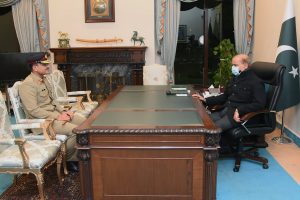Prime Minister Shehbaz Sharif on Thursday appointed Lieutenant General Asim Munir as the new chief of army staff (COAS). The decision comes after weeks of intense speculation and reported infighting among political parties to choose the potential candidate for the most powerful office in the country.
“The process has been completed in accordance with the law and Constitution,” Defense Minister Khawaja Muhammad Asif told reporters in Islamabad after Sharif made the announcement.
Munir, the most senior of six generals considered for the position, will replace Lt. Gen. Qamar Javed Bajwa, who will retire on November 29 after commanding the army for six years.
The incoming chief has many achievements to his name. A recipient of the Sword of Honour from the 17th course of the Officers Training School in Mangla, he was promoted to the rank of lieutenant general in September 2018. He has previously served as the director general of Military Intelligence (MI) and of the Inter-Services Intelligence (ISI), the country’s two premier intelligence organizations. He rose up the ranks through sheer dedication and hard work and is well respected by the rank and file of the institution.
The selection of Munir demonstrates that the country’s civilian leadership has learned, albeit the hard way, that in the selection of the army chief merit and seniority should be their guiding principle rather than political considerations, which have proved costly in the past. When political leadership makes a choice based on merit and seniority, they not only elevate their own credibility but also help settle some structural concerns of an institution where distinction and excellence are well regarded by the rank and file.
The appointment of Munir is an indication that the military establishment’s intent to stick to its constitutional role and open space for democratic functioning in the country will mature in the coming months and years. “The civil-military leadership couldn’t have chosen a more professional and pro-democracy general from the current lot of officers,” a government official told The Diplomat on condition of anonymity. “The appointment is a good sign for Pakistan’s democratic forces.”
The crucial appointment offers a new opportunity for all important stakeholders in the country to bury the hatchet and move forward in Pakistan’s best interest. The manner in which political parties cooperated on Munir’s appointment this week, it does seem that the military’s message that “the time has come for political stakeholders to set aside ego, move forward” was well received by the civilian leadership.
The cooperation that political parties showed over Munir’s appointment is arguably the first time that Pakistan Tehreek-e-Insaaf chief and former Prime Minister Imran Khan, who was ousted from office in April through a vote of no-confidence, has shown a willingness to work with the current government to fulfill a constitutional duty without much drama.
That said, the appointment is a major defeat for Khan, who for months lobbied to influence the decision and attempted to undermine the outgoing army chief and his institution’s declared resolve to stay out of politics.
It is unclear how Munir will react if Khan continues to target his institution to charge his political base. What is clear is that the military leadership’s patience with Khan’s baseless propaganda appears to be running thin. The new army chief may not allow space for it, especially if it comes at the cost of his institution’s stability and internal cohesion.
Munir has little time to settle into the job. He has his work cut out as Pakistan faces a deepening political and financial crisis. Militant groups are once again knocking on Pakistan’s Afghan border, with Baloch extremists making new efforts to undermine the China-Pakistan Economic Corridor (CPEC). The general will have to deal with India, which is working around the clock to undermine Pakistan’s interests globally.
Besides, there are numerous issues involving Pakistan’s ties with the world, which await his attention in the coming days and weeks.
Above all, Munir is expected to push to ensure that Pakistan gets the much-needed political stability, which the country has craved for months. This is crucial at a time when Pakistan faces an acute financial crisis and investors are looking for signs of stability before committing funds and investments.
Munir’s arrival will ease some of the concerns of investors, including those countries that are friendly with Pakistan but remain worried about Islamabad’s prospects amid the ongoing political crisis in the country.

































